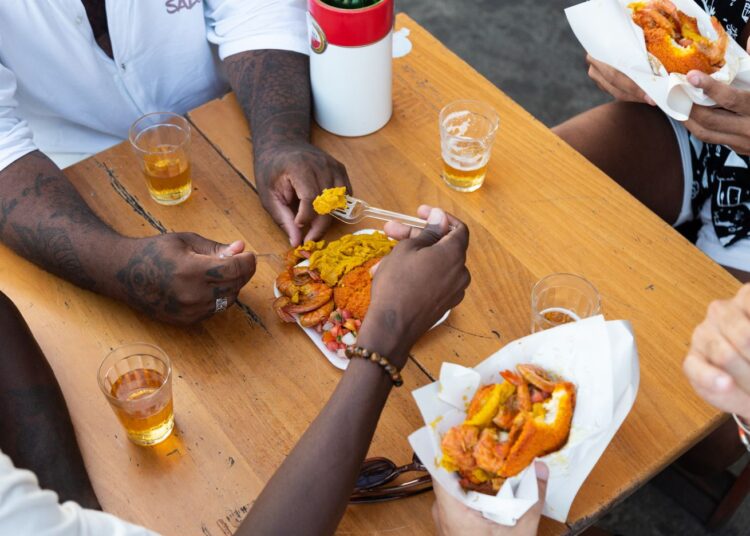Diners at Acarajé de Cira. | Brenda Matos
Black-eyed pea fritters from buzzing street vendors, grilled seafood in a 400-year-old mansion, brothy duck rice by the beach, and more of the best food in the “Black Rome” of Brazil
Salvador sits on Brazil’s South Atlantic coast, in the idyllic state of Bahia, home to some of northeastern Brazil’s most beautiful beaches. The vibrant city was founded in 1549 by the Portuguese as the first capital of colonial Brazil and remained that way for two centuries (before ceding the title first to Rio then Brasília), leaving a lasting historical, cultural, and culinary impact on the modern country.
With its complex mishmash of African, Indigenous, and European influences, Salvador has earned the local nickname “the Black Rome” in recognition of its central place in the community of Afro Brazilians, who make up 80 percent of the local population. While techniques from Portuguese colonizers form much of Brazil’s cuisine, enslaved Africans who settled in Salvador were vital in shaping local dining too. Substantial, hearty, and tropically flavored, cozinha Baiana (Bahian cuisine) is a melting pot of European cooking methods (lots of stews), pre-Columbian ingredients (like cassava), and African spices and products (like dendê oil and okra). The culinary culture is also influenced by Candomblé, a syncretic Afro Brazilian religion drawn from the cultures of enslaved West Africans in which worshipers honor different orixás (deities) with specific dishes.
Today, the city is a top-class food destination merging casual botecos (bars) and cheerful modern restaurants serving popular dishes such as moqueca (Brazilian seafood stew with fish broth and cassava porridge) and vatapá (seafood stew with coconut milk), and street vendors selling items like acarajés (black-eyed pea fritters). Dive into the rich culinary heritage and booming modern restaurant scene in the capital of Bahia.
Rafael Tonon is a journalist and food writer living between Brazil and Portugal. He is the author of the book The Food Revolutions.














